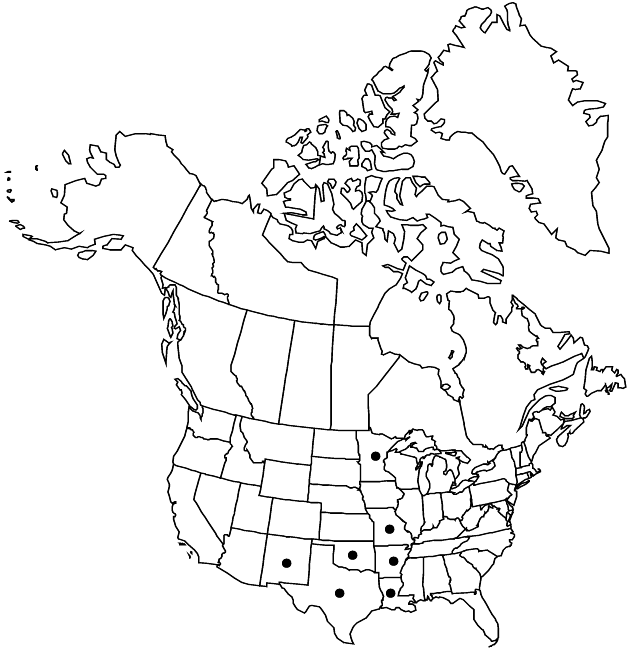Cirsium texanum
Proc. Acad. Nat. Sci. Philadelphia 13: 460. 1862.
Annuals or biennials, 20–200 cm; taprooted. Stems usually single, erect, tomentose to ± glabrate; branches 0–many, usually restricted to distal part, ascending. Leaves: blades oblong to elliptic, 7–30 × 2–12 cm, unlobed and merely spinulose to irregularly dentate or shallowly to deeply pinnatifid, lobes ± triangular, separated by narrow to wide sinuses, sometimes coarsely dentate or lobed proximally, obtuse to acute, main spines slender to stout, 1–5 mm, abaxial faces arachnoid tomentose, adaxial glabrous or thinly arachnoid; basal often absent at flowering, petioles slender, ± winged; cauline progressively reduced, proximal petiolate, mid and distal broadly sessile, bases ± auriculate-clasping or decurrent 1–3 cm; distalmost linear to lanceolate, bractlike, irregularly dentate or shallowly lobed. Heads 1–many, in openly paniculiform arrays. Peduncles slender, 3–30 cm (not overtopped by crowded distal leaves). Involucres ovoid to hemispheric, 1.5–2 × 1.5–2 cm, thinly arachnoid, glabrate. Phyllaries in 8–10 series, imbricate, green, lanceolate (outer) to linear (inner), abaxial faces with prominent glutinous ridge; outer and middle appressed, bodies entire, acute, spines spreading, slender, 1–5 mm; apices of inner often flexuous, flat, scabrid-ciliolate, acuminate. Corollas white to pink-purple, 20–25 mm, tubes 7–10 mm, throats 6–8 mm (noticeably wider than tubes), lobes 4–7 mm; style tips 3–4 mm. Cypselae brown, 3–5 mm, apical collars not differentiated; pappi 15–16 mm. 2n = 22, 23, 24.
Phenology: Flowering spring–summer (Apr–Jul).
Habitat: Roadsides, pastures, fields, shrub-tree savannas
Elevation: 0–1000 m
Distribution

Ark., La., Mo., N.Mex., Okla., Tex., Mexico (Coahuila), Mexico (Durango), Mexico (Nuevo León), Mexico (San Luis Potosí), Mexico (Tamaulipas)
Discussion
Cirsium texanum ranges from the Chihuahuan Desert regions of trans-Pecos Texas and adjacent southeastern New Mexico across the plains of Texas and southern Oklahoma to southwestern Arkansas and southwestern Louisiana and south into north-central Mexico. D. S. Correll and M. C. Johnston (1970) suggested hybridization between Cirsium texanum and C. undulatum to explain anomalous specimens in the Edwards Plateau and trans-Pecos regions of western Texas.
Selected References
None.
Lower Taxa
"fine" is not a number."narrow" is not a number. "wide" is not a number.